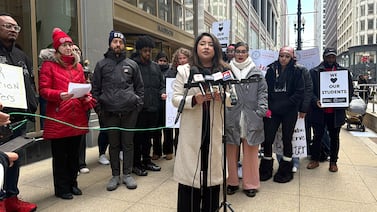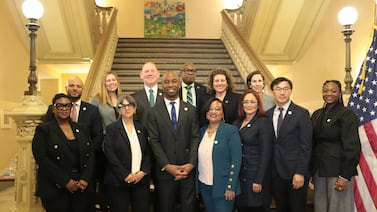Michigan’s K-12 schools and free pre-K program for 4-year-olds got historic funding boosts in a budget deal reached Wednesday in Lansing.
But $1.4 billion in federal coronavirus relief for child care won’t be distributed until after state lawmakers return from their weeks-long summer recess, even as business leaders warn that a stable child care supply is essential to Michigan’s economic recovery.
Months after the Biden administration sent $39 billion to states to help child care providers weather the pandemic, some states have begun distributing their share of the funds.
Lansing lawmakers have yet to follow suit. That’s left private child care providers, who account for most child care slots statewide, to struggle with declining enrollment and relentless teacher turnover on their own.
The need is urgent, especially in low-income communities, said Shirley Howard, owner of Pencil Palace Daycare Nursery in west Detroit, one of the oldest daycares in the city.
“We don’t want to run out of payroll,” she said. “When [children] don’t show up, it affects our budget. Because of the community we serve, we don’t charge tuition when they don’t come.”
Nearly three quarters of Howard’s families qualify for the state’s child care subsidy, which covers most or all of the cost of care for low-income families. That means Pencil Palace, like many private child care centers in Michigan’s low-income communities, is largely dependent on state payments tied to daily attendance. Even when enrollment is at normal levels, advocates say the payments are too small to cover the costs of quality care.
Educators and researchers broadly agree that early learning is a linchpin of students’ success in K-12 schools and beyond. Yet access to child care is starkly limited in many parts of Michigan, and low pay ensures that teachers turn over constantly, reducing the quality of care.
One bright spot for the state is the Great Start Readiness Program, a free, high-quality preschool program that got a 40% funding boost in the education budget passed Wednesday. But that program only serves 4-year-olds, and there is evidence that its growth has hurt the private child care sector by removing students who require less supervision and are thus cheaper to care for.
Senate Appropriations Committee Chair Jim Stamas, a Republican of Midland, defended the decision to prioritize passing the K-12 budget over allocating the federal COVID aid, saying lawmakers still needed to “thoughtfully consider the once-in-a-lifetime federal funding we have received and how we best utilize them to make a lasting improvement in investment in our state.”
Advocates noted that federal aid for child care has already been allocated in other states, including Kentucky, Iowa, and Montana.
“If we’re going to get back to work, then we know child care is vital,” said Denise Smith, a child care advocate and implementation director of Hope Starts Here. “We have to make sure that they’re able to provide the services needed. And right now they’re just hobbling along. The longer we wait, the worse it gets. I don’t want to lose another program.”
The budget passed Wednesday offers some clues as to how Michigan will spend its remaining $1.4 billion in federal COVID relief funding for child care. Lawmakers directed the Michigan Department of Education to begin designing a grant program for early childhood providers, which would use about half of the funding under current proposals.
Rep. Jack O’Malley, a Republican from northwest Michigan said he believes there’s already agreement about some parts of the spending plan, including a shift to paying providers based on their enrollment rather than daily attendance. That change, long sought by providers, protects against sharp, unexpected declines in state funding.
But other aspects of the plan are still up in the air. Some advocates hope the state will expand the child care subsidy program to more families using federal dollars then maintain the larger program using state dollars once the federal aid runs out.
O’Malley disagrees: “We can’t sustain that,” he said. “To do that, we’re going to have to take money from someplace else, and no one wants their budget cut.”
There is also ongoing debate about a set of bills O’Malley helped introduce last month, which reduce some regulations around child care and create programs to open centers in underserved areas.
The time for debate has passed, said Peranica Williams, owner of My Nanny Extended Child Care Services, a home-based child care program in Detroit. She’s had to reduce her services during the pandemic, which means less money to pay teachers and provide learning materials that ensure students receive high-quality care.
“They don’t pay enough [in child care subsidies], and for them to be going on vacation and not even looking at it, it’s letting us know that child care is not important,” she said.
“Although we know that if we don’t have child care, parents can’t go to work.”






